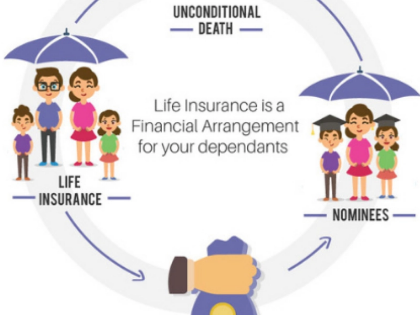Which is Better for You: Whole Life or Term Life Insurance?
Your loved ones are protected when you pass away by whole-life and term insurance. However, the costs and benefits of each variety vary. A whole-life policy includes a savings component that accumulates cash value and provides coverage for the duration of your life. Additionally, you have the option to borrow against or remove the cash value (although doing so may lower your death benefit). Term life insurance is usually less expensive than full life insurance.
Price
 Although it may be easy to prioritize price, your financial and personal objectives will determine the best life insurance plan for you. Before making a choice, evaluate your circumstances and speak with a certified financial advisor or insurance agent.
Affordable coverage is provided by term life insurance for a predetermined amount of time, typically between 10 and 30 years. In the event that the policyholder dies during the term, they pay a death benefit, providing you with the assurance that your loved ones will be provided for.
Whole life insurance policies are a kind of permanent life insurance that provide lifetime coverage and have the potential to accrue financial value. You can borrow against or withdraw the cash value, which grows tax-deferred, but doing so would lower the death benefit. Because whole life insurance includes investment components and offers lifetime coverage, its premiums are usually higher than those of term life policies.
Although it may be easy to prioritize price, your financial and personal objectives will determine the best life insurance plan for you. Before making a choice, evaluate your circumstances and speak with a certified financial advisor or insurance agent.
Affordable coverage is provided by term life insurance for a predetermined amount of time, typically between 10 and 30 years. In the event that the policyholder dies during the term, they pay a death benefit, providing you with the assurance that your loved ones will be provided for.
Whole life insurance policies are a kind of permanent life insurance that provide lifetime coverage and have the potential to accrue financial value. You can borrow against or withdraw the cash value, which grows tax-deferred, but doing so would lower the death benefit. Because whole life insurance includes investment components and offers lifetime coverage, its premiums are usually higher than those of term life policies.
Reportage
 The most coverage at the lowest cost is provided by term life insurance. The coverage will terminate, though, if your family's financial situation changes or if you are unable to continue paying premiums. You then have two options: either purchase a new policy at a greater cost or forgo getting life insurance altogether.
Together, you and Aflac can choose a life insurance plan that best suits your requirements. Term insurance is typically purchased to pay for particular bills and costs, such as mortgages and children's college tuition. Whole life insurance, which spans an individual's whole lifetime, is another option for those with long-term financial objectives.
Whole life insurance, in contrast to term policies, has a cash value component that is subject to tax-deferred growth. If necessary, you can take money out of or borrow against this cash value, but doing so will lower the death benefit. Furthermore, whole-life insurance policies can provide your beneficiaries with peace of mind, but they are usually more expensive than term insurance.
The most coverage at the lowest cost is provided by term life insurance. The coverage will terminate, though, if your family's financial situation changes or if you are unable to continue paying premiums. You then have two options: either purchase a new policy at a greater cost or forgo getting life insurance altogether.
Together, you and Aflac can choose a life insurance plan that best suits your requirements. Term insurance is typically purchased to pay for particular bills and costs, such as mortgages and children's college tuition. Whole life insurance, which spans an individual's whole lifetime, is another option for those with long-term financial objectives.
Whole life insurance, in contrast to term policies, has a cash value component that is subject to tax-deferred growth. If necessary, you can take money out of or borrow against this cash value, but doing so will lower the death benefit. Furthermore, whole-life insurance policies can provide your beneficiaries with peace of mind, but they are usually more expensive than term insurance.
Taxes
 The decision between term and whole life insurance will depend on your individual needs, even though both types of life insurance provide a death benefit. Term life insurance, for example, can be adequate if you want coverage for a specific time, such as until your mortgage is paid off or your children are financially independent. Conversely, whole life insurance provides more flexibility because it is a lifetime policy with a cash value component that grows tax-deferred.
Additionally, whole life insurance provides your beneficiaries with a death benefit that is usually tax-free. But because it offers lifetime coverage and contains an investment component that builds up over time, it is more expensive than term life insurance. This will result in higher premiums for the duration of your policy, but it may be advantageous if you want to guarantee that your beneficiaries will get a sizable payment in the event of your death.
The decision between term and whole life insurance will depend on your individual needs, even though both types of life insurance provide a death benefit. Term life insurance, for example, can be adequate if you want coverage for a specific time, such as until your mortgage is paid off or your children are financially independent. Conversely, whole life insurance provides more flexibility because it is a lifetime policy with a cash value component that grows tax-deferred.
Additionally, whole life insurance provides your beneficiaries with a death benefit that is usually tax-free. But because it offers lifetime coverage and contains an investment component that builds up over time, it is more expensive than term life insurance. This will result in higher premiums for the duration of your policy, but it may be advantageous if you want to guarantee that your beneficiaries will get a sizable payment in the event of your death.
Value in cash
 The cash value component that whole life plans provide is absent from term policies. Rather, they usually expire at the end of the term and need to be either terminated or renewed for a cost. At that time, you'll have to either forgo insurance altogether or get a new policy at a higher rate.
A portion of the premium for whole life plans is used to accumulate cash value, which can be borrowed and increases over time on a tax-deferred basis. However, your death benefit will be decreased if you take out any loans or withdrawals against the cash value of the policy.
When deciding between a term and whole-life policy, it's critical to take your family's financial objectives and existing spending situation into account. Other permanent insurance options, like variable and universal life, might be a better fit. These choices are often more expensive than whole life insurance, but they can invest in growth-oriented asset classes and serve as a savings account.
The cash value component that whole life plans provide is absent from term policies. Rather, they usually expire at the end of the term and need to be either terminated or renewed for a cost. At that time, you'll have to either forgo insurance altogether or get a new policy at a higher rate.
A portion of the premium for whole life plans is used to accumulate cash value, which can be borrowed and increases over time on a tax-deferred basis. However, your death benefit will be decreased if you take out any loans or withdrawals against the cash value of the policy.
When deciding between a term and whole-life policy, it's critical to take your family's financial objectives and existing spending situation into account. Other permanent insurance options, like variable and universal life, might be a better fit. These choices are often more expensive than whole life insurance, but they can invest in growth-oriented asset classes and serve as a savings account.













